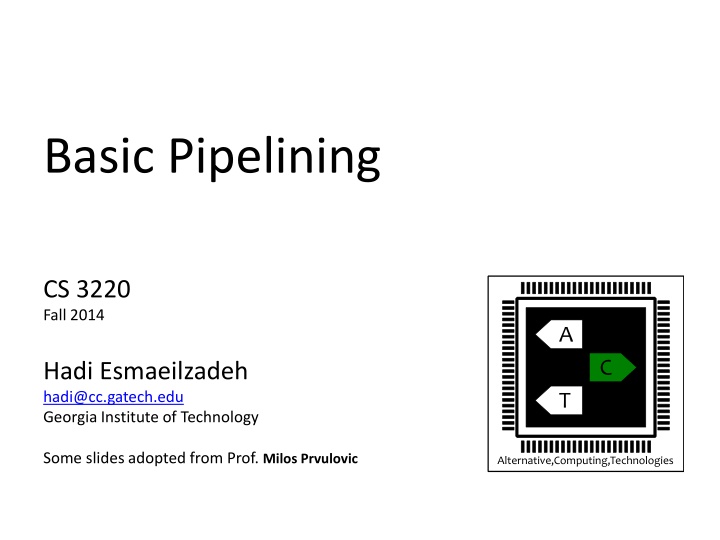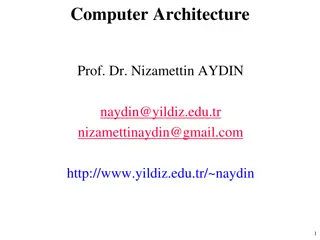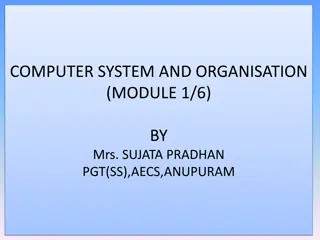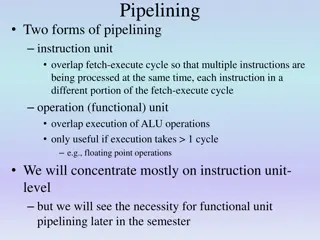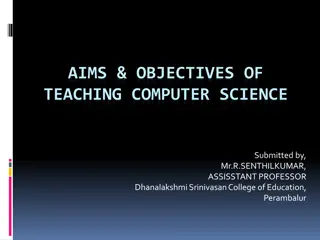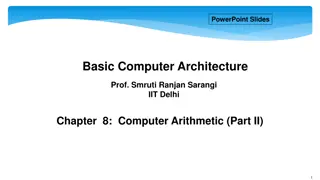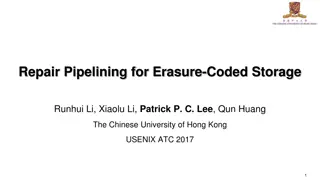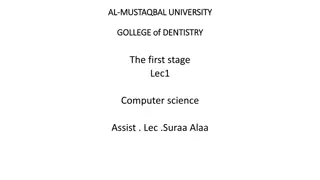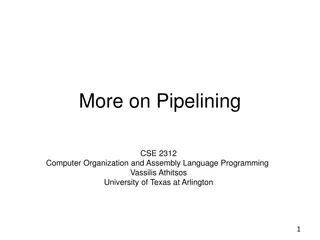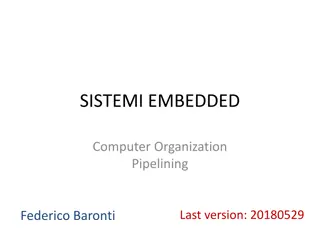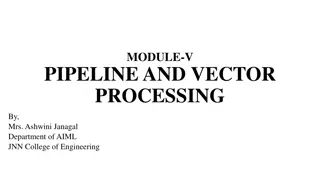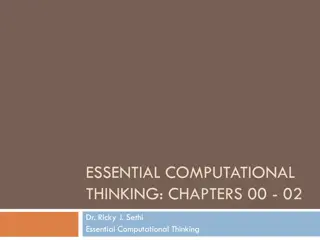Basic Pipelining in Computer Science
Exploring the concept of basic pipelining in computer science, focusing on a two-stage pipeline and key decisions involved in the process. The discussion covers pipeline stages, memory handling, control decisions, Verilog implementation, and keeping the design simple to understand and implement effectively.
Download Presentation

Please find below an Image/Link to download the presentation.
The content on the website is provided AS IS for your information and personal use only. It may not be sold, licensed, or shared on other websites without obtaining consent from the author.If you encounter any issues during the download, it is possible that the publisher has removed the file from their server.
You are allowed to download the files provided on this website for personal or commercial use, subject to the condition that they are used lawfully. All files are the property of their respective owners.
The content on the website is provided AS IS for your information and personal use only. It may not be sold, licensed, or shared on other websites without obtaining consent from the author.
E N D
Presentation Transcript
Basic Pipelining CS 3220 Fall 2014 A C Hadi Esmaeilzadeh hadi@cc.gatech.edu Georgia Institute of Technology T Some slides adopted from Prof. Milos Prvulovic Alternative,Computing,Technologies
Two-Stage Pipeline Why not go directly to five stages? This is what we had in CS 2200! Will have more stages in Project 3, but We want to start with something easier Lots of things become more complicated with more stages Let s first deal with simple versions of some of these complications Will learn how to decide when/how to add stages Start with two, then decide if we want more and where to split 25 Feb 2014 Basic Pipeline 2
Pipelining Decisions What gets done in which stage Memory address for data reads must come from FFs Memory read must be at the start of some stage With only two stages, this has to be stage two! Must be in first stage Fetch, and all the other stuff needed for memory address: decode, read regs, ALU (or at least the add for memaddr) Must be in last stage Read memory, write result to register Where does branch/jump stuff go As early as possible (will see why) => first stage 25 Feb 2014 Basic Pipeline 3
Creating a 2-stage pipeline M X Control 4 P C Instr Mem A RF M X Data Mem M X D SE 25 Feb 2014 Basic Pipeline 4
Pipeline FFs in Verilog assign dmemaddr=aluout; M X reg [31:0] aluout_M; always @(posedge clk) aluout_M<=aluout; assign dmemaddr=aluout_M; Control ADD 4 ADD P C Instr Mem A RF M X Data Mem M X ALU D SE 25 Feb 2014 Basic Pipeline 5
Two-Stage Pipeline So far we have Stage 1: Fetch, ReadReg, ALU Stage 2: Read/Write Memory, WriteReg What is left to decide? Where is the PC incremented? Input: PC (available at start of stage 1) Work: Increment (doable in one cycle) Do it in stage 1! Where do we make branch taken/not-taken decisions? Depends try in cycle 1, but if this is critical path, try to break it up 25 Feb 2014 Basic Pipeline 6
Keep things simple Our goal is to get this working! Handling each type of hazard will complicate things Avoid doing things that create hazards Structural hazards? Noooo! We will put enough hardware to not have any! Control hazards? 25 Feb 2014 Basic Pipeline 7
Data hazard example ADD R1,R2,R3 ADD R4,R2,R1 What happens in our two stage pipeline? C1: aluout_M<=R2+R3 C2: R1<=aluout_M; aluout_M<=R2+R1 (problem!) C3: R4<=aluout_M 25 Feb 2014 Basic Pipeline 8
Data hazard example 2 LW R1,0(R2) ADD R3,R1,R4 What happens in our two stage pipeline? C1: aluout_M<=0+R2 C2: R1<=mem[aluout_M]; aluout_M<=R1+R4 25 Feb 2014 Basic Pipeline 9
Preventing data hazards Simplest solution for HW designers Tell programmers not to create data hazards! ADD R1,R2,R3 <Instruction that does not use R1> ADD R4,R2,R1 What if we have nothing to put here? NOP 25 Feb 2014 Basic Pipeline 10
What is a NOP? Does not do anything How about AND R0,R0,R0 ? Whatever is in R0, leaves it unchanged Why is this not a good NOP? ; Initially R0 is some random value XOR R0,R0,R0 NOP ; Becomes AND R0,R0,R0 ADDI SP,R0,StackTop ADDI A1,R0,1 What is in SP now? What is in A1 now? 25 Feb 2014 Basic Pipeline 11
Need a real NOP Actually does nothing Not just writes the same value wrreg,wrmem, isbranch, isjump, etc. must all be zero! None of our instructions is a truly perfect NOP So let s add one! Hijack existing instruction, e.g. AND R0,R0,R0 ? It works! This instruction is not supposed to do anything anyway! Add a separate instruction (and spend an opcode) Also works! But spend a secondary opcode Let s use ALUR with op2=1111 (and all other bits 0) NOP translates to instruction word 32 h000000F 25 Feb 2014 Basic Pipeline 12
Control hazards No problem if all insts update PC in first stage PC+4 is easy, but branches and jumps not so easy What if PC+4 in cycle 1, but the rest in cycle 2 JAL RA,Func(Zero) BNE RV,Zero,BadResult ADD T0,RV,RV BadResult: Func: C1: PC<=PC+4 C2: PC<=Func C2: Fetch C3: PC=<BadResult C4: Fetch C3: Fetch 25 Feb 2014 Basic Pipeline 13
Preventing control hazards Simplest solution for HW designers Tell programmers that branch/jump has delayed effect Delay slot: inst after branch/jump executed anyway JAL RA,Func(Zero) NOP ; Delay slot BNE RV,Zero,BadResult NOP ; Delay slot 25 Feb 2014 Basic Pipeline 14
Deeper pipelines Need more NOPs More instructions between reg write and reg read Hard to find useful insts to put there => NOPs More delay slots to survive control hazards Hard to find useful insts to put there => NOPs Problem 1: Performance Note that CPI is 1, but program has more instructions! Problem 2: Portability Program must change if we change the pipeline What works for 2-stage needs more NOPs to run on 3-stage, etc. 25 Feb 2014 Basic Pipeline 15
Architecture vs. Microarchitecture Architecture What the programmer must know about our machine Microarchitecture How we implement our processor Can write correct code without knowing this Our hazards solution Pipelining = microachitecture Delay slots, etc. = architecture We changed architecture (in a backward-incompatible way) to make our microarchitecture work correctly! 25 Feb 2014 Basic Pipeline 16
Proper handling of hazards Programs (executables) don t change Test2.mif, Sorter2.mif from Project2 still run correctly Must fight hazard problems in hardware Our big weapon: flush an instruction from pipeline Our better weapon: stall some stages in the pipeline Our precision weapon: forwarding Can t fix everything, but helps reduce the number of flushed insts 25 Feb 2014 Basic Pipeline 17
What is a flush Flush an inst from some stage of the pipeline == convert the instruction into a real NOP Note: cannot flush any inst from any stage Can t flush inst that already modified architected state E.g. if SW already wrote to memory, can t flush it correctly E.g. if BEQ/BNE/JAL already modified the PC, can t flush it correctly To prevent hazards from doing damage Must detect which instructions should be flushed And then flush these instructions early enough! 25 Feb 2014 Basic Pipeline 18
The Rules of Flushing When we must flush an instruction When not doing so will produce wrong result When we can flush an instruction Almost any time we want (if early enough), but must guarantee forward progress E.g. can t just flush every single instruction as soon as fetched Lots of room between the can and the must For performance, get as close to must as possible For simplicity, may do some can but not must flushes 25 Feb 2014 Basic Pipeline 19
Simple flush-based hazard handling Find out K, the worst-case number of NOPs # of NOPs between insts that prevents all hazards E.g. in out 2-stage pipeline it s 1 NOP If stages numbered 1..N, we flush the first K stages whenever a non-NOP inst in stage K+1 E.g. in our 2-stage pipeline, we would flush stage 1 whenever a non-NOP is in stage 2 What is the resulting CPI for the 2-stage piepline? 25 Feb 2014 Basic Pipeline 20
Fewer flushes Data hazards - when we don t have to flush If without flushing NOPs would not be needed If inst in stage K+1 has wrreg=0, E.g. SW doesn t need NOPs after it If inst in stage K+1 writes to regno we don t read E.g. ADD R1,R2,R3 can be safely followed by ADD R2,R3,R4 If forwarding or stalling fixes the problem We ll talk about this later Control hazards when we don t have to flush If we fetched from the correct place, e.g. if we fetched from PC+4 and BEQ not taken 25 Feb 2014 Basic Pipeline 21
Flushing in Verilog code For a pipeline FF between some stages A and M: always @(posedge clk or negedge reset) if(reset) wrreg_M<=1 b0; else wrreg_M<=wrreg_A; flush_A?1 b0:wrreg_A; 25 Feb 2014 Basic Pipeline 22
Stalling Stops instructions in early stages of the pipeline to let farther-along instructions produce results Creates a bubble (a NOP) between the stopped instructions and the ones that continue to move For data hazards, stalls can entirely eliminate flushes The bubble NOP is like a NOP we inserted into the program But without changing the program Why is a stall better than a flush? When flushing some stage S (because of a dependence) , must also flush stages 1..S-1 (can t execute insts out-of-order) Adds S new NOPs to the execution When stalling stage S, must also stall stages 1..S-1 But each stall cycle inserts only one NOP (in stage S+1) Control hazard => we fetched wrong instructions Delaying them won t solve anything, so they must be flushed 25 Feb 2014 Basic Pipeline 23
When to Stall Like flushes, the must and the can differ No real must: we can avoid hazards by flushing But we want to stall if that can avoid a flush And we canstall whenever it s convenient Must still ensure forward progress! Stalling to handle data dependences Simplest (and slowest) approach: Stall read-regs stage until nothing remains in later stages With 2-stage, stall stage 1 if a non-NOP is in stage 2 Faster but more complex approaches Stall until no register-writing instruction remains in later stages Stall until no inst that writer to my src registers remains in later stages Stall until forwarding can get us the values we need 25 Feb 2014 Basic Pipeline 24
Stalling in Verilog code For a pipeline FF between some stages A and M: always @(posedge clk or negedge reset) if(reset) wrreg_M<=1 b0; else if(flush_A) wrreg_M<=1 b0; else if(!stall_A) wrreg_M<=wrreg_A; Note 1: if stalling stage X, must also stall stages before it Note 2: when stalling fetch stage, don t let PC change! 25 Feb 2014 Basic Pipeline 25
How to do Project 3 Get it working with NOPs in the code Change code to add NOPs in the right places Note: right places will change with pipeline depth This gets you 30 points Get it working with heavy stalls and flushing Must run with original code (no NOPs added in .a32) With flush K support in the pipeline: +20 points More points if you use stalls to make it faster Then try to use smarter stalls and flushing Very little of this will get you the other 50 points 25 Feb 2014 Basic Pipeline 26
Smart stalling example With two stages (F and M): assign stall_F=wrreg_M && ( (wregno_M==rregno1_F) || (wregno_M==rregno2_F) ); 25 Feb 2014 Basic Pipeline 27
Smart stalling with more stages Which stage to stall? The first stage where hazard makes us do something wrong that we won t fix later With two stages, this is first stage We read wrong value from regs, and we use that wrong value in ALU With five stages w/o forwarding, this is reg-read Wrong value from reg, must stall to read again With five stages w/ forwarding? Reading wrong reg value is OK, forwarding fixes that But if we forward the wrong value stall the stage in which we do forwarding! 25 Feb 2014 Basic Pipeline 28
Staling >1 stage If we stall stage X, must also stall stages 1..X-1 Depending on what is done in which stage, different hazards might stall different stages In general, with stages A,B,C,etc.: assign stallto_A=<when to stall only A stage>; assign stallto_B=<when to stall up to stage B>; assign stallto_C=<when to stall up to stage C>; assign stall_A=stallto_A||stall_B; assign stall_B=stallto_B||stall_C; This is in your hazard detection logic Use these in the actual code that stalls pipeline-FF writes 25 Feb 2014 Basic Pipeline 29
